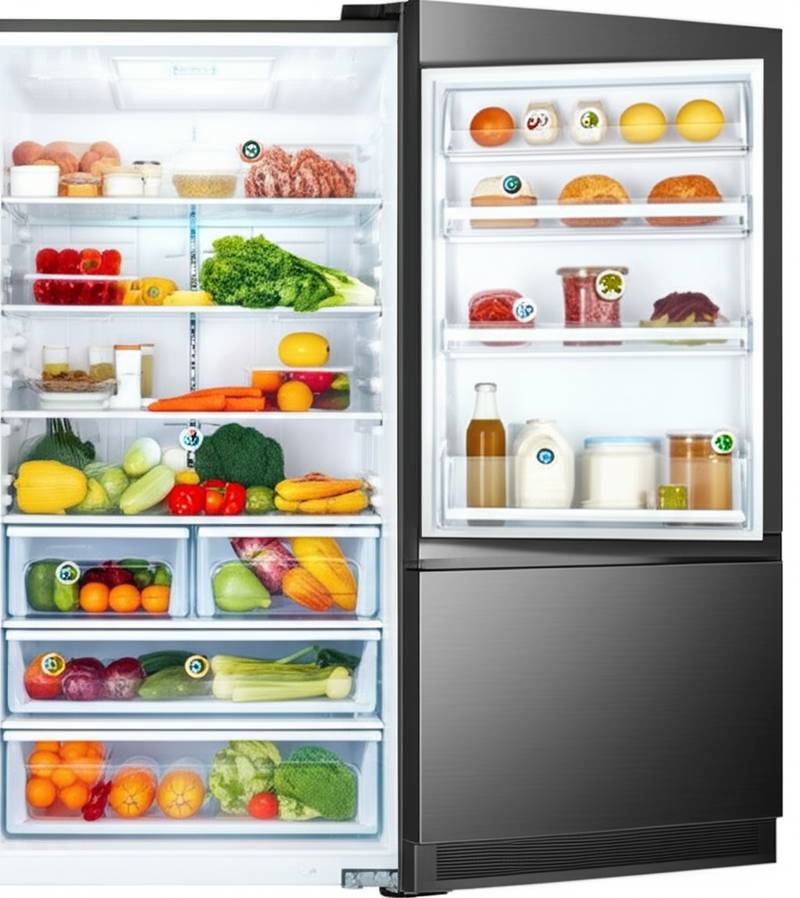Smart Refrigerators Monitor Food Freshness for Family Safety
Smart homes now prioritize health and safety alongside convenience. Leading this advancement are smart refrigerators that actively detect food spoilage. Equipped with sensors, cameras, and algorithms, these appliances serve as vigilant overseers of stored groceries, helping households minimize waste, control expenses, and avoid health hazards from contaminated food.
Understanding the Risks of Undetected Spoilage
Households often discover spoiled items hidden in refrigerator compartments, leading to unexpected waste and potential illness. Globally, food waste contributes significantly to environmental degradation, while spoiled products can cause foodborne diseases. Conventional refrigerators offer no assistance in this area, forcing users to depend on memory or expiration dates. As connected devices proliferate, appliance designers are enhancing refrigerators to provide reliable protection.
Advanced Sensors That Track Food Conditions
Contemporary smart refrigerators incorporate gas sensors, humidity detectors, and high-resolution internal cameras to assess item conditions. These components identify fluctuations in temperature or gases like ethylene from ripening fruits and ammonia from decaying proteins. Upon detecting anomalies, the refrigerator sends notifications via a linked smartphone application or its display panel.
This capability positions the refrigerator as an active participant in food management. Certain models from prominent manufacturers scan meat and dairy to forecast spoilage timelines and prompt immediate use. Additional features include recipe recommendations tailored to items approaching expiration, ensuring efficient utilization of resources.
The Role of Artificial Intelligence in Predictive Monitoring
Artificial intelligence processes sensor data to deliver precise insights. The system adapts to user habits, such as common food types and their typical shelf lives, by analyzing patterns from visual and environmental inputs. Integration with barcode scanners or receipt uploads further refines predictions, forming a comprehensive inventory system.
Market research indicates rising demand for such technologies amid heightened awareness of waste reduction and contamination prevention. This aligns with the expansion of intelligent living environments. Future iterations promise greater precision, fewer erroneous notifications, and simplified upkeep routines.
Practical Innovations from Leading Brands
Major appliance companies have launched refrigerators with sophisticated spoilage detection systems. Interior cameras in select models identify produce and proteins, updating freshness status through dedicated applications. Chemical sensors in others evaluate internal air composition for early decay signals.
Emerging solutions include modular attachments for legacy refrigerators, enabling smart functionality without full replacement. One provider's ethylene sensor connects to a mobile app, notifying users of accelerated fruit ripening. Another employs illuminated indicators within the unit to display freshness zones visually, facilitating quick assessments during routine checks.
Tangible Advantages for Daily Household Management
These refrigerators extend benefits far beyond discarding outdated dairy or produce. Automated tracking and reminders streamline shopping, curbing excess purchases and promoting portion control. Users achieve cost savings through optimized ingredient use and gain assurance in meal preparation safety.
Individuals focused on nutrition or managing specific diets find particular value. Compatibility with health applications allows personalized recipe ideas from verified fresh stocks. For those with allergies, the system flags potential risks, easing planning and enhancing overall dietary adherence.
Integrating Spoilage Detection into Your Kitchen Routine
Adopting a spoilage-detecting refrigerator fosters proactive home environments that support sustainability and well-being. Technology advancements ensure these tools evolve into essential fixtures. Consider models that automate inventory, suggest timely consumption, and align with balanced eating goals. This upgrade delivers not only efficiency but also reliable safeguards for family health.
